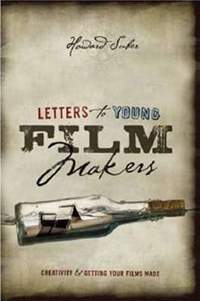
What follows is a real treat. Suber's attitude is that filmmakers are not born (or at least rarely) and thus they they need training in their profession just like anyone else, so that's what is at the heart of Letters to Young Filmmakers, becoming a professional. Like I said at the outset, this isn't a book about screenwriting, although it addresses the craft, it's not a book about directing, although it is in there, it's not a book about production although he answers letters from would-be producers it's a book for all of those people, and it shows how a professional in the field would behave in any given scenario. Simply put, it's a book about collaboration.
It might sound like a strange subject to hang a book on but when you think about, and Suber will make you think about it, a writer, painter or sculptor, as in most art forms, can just wake up and start work and when he's done people will pay him for his art and he will move on. In film, unlike any other artistic medium, you cannot do this, you need other people to make it happen, you need collaborators and you need money and you're not going to get any of those things unless you learn how to act around others. He puts it best himself when he says "professional filmmaking involves (1) the creative process and (2) the process that makes creation possible" and whether you're a writer, director, cinematographer, costume designer or make up artist if you want to call yourself a filmmaker you need to get the film made.
There are so many letters that it would be an injustice to single any out but they cover everything from ideas and pitching to strategy and artistic freedom, logistics, copyrights, ageism, aggression, negotiating, agents, managers, credits, costs - the list is pretty exhaustive and whether the exchange is from a debut screenwriter reeling from that first offer or a young producer who doesn't want to be seen as just another 'suit' the questions are grounded and come from the real fears in all of us. Written in an easy going and very friendly style Suber is honest and forthright in his answers and opinions, doesn't often take sides and more often than not offers real insight rather than hackneyed platitude.
Filmmaking is without doubt a collaborative art and unlike any other. Success or failure can turn on a sixpence but with wit and wisdom Suber shows the best attitude and approach to a successful filmmaking career. But actually it goes deeper than that. The lessons Suber imparts about collaboration and cooperation are good ones, important ones, and apply equally not just to filmmaking but to life itself, and we would all do well to pay heed.
You can read a sample over at Scribd.
Howard Suber has a website.